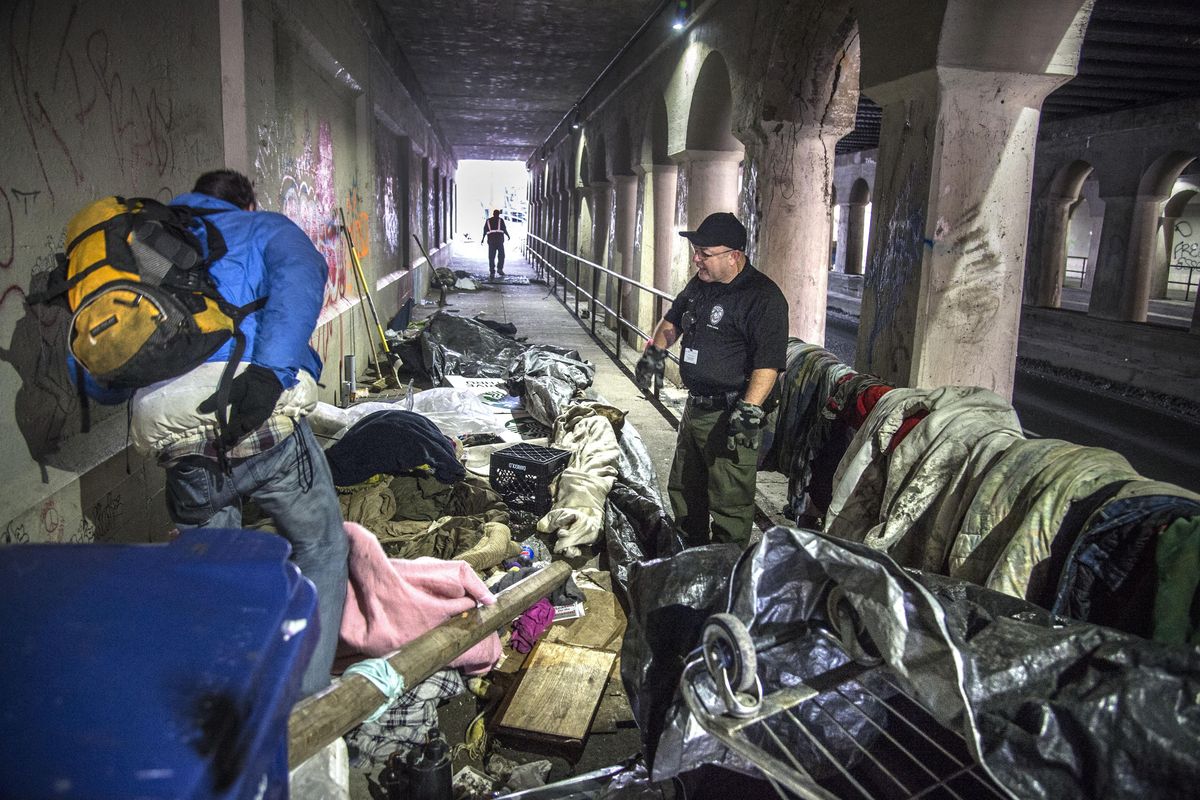Inmate cleanup crews target downtown Spokane viaducts, overpasses

Ricky Griffis popped his head out of a bundle of blankets in the viaduct on Browne Street early one morning last week, still groggy from sleeping on the pavement.
Bobby McGowan, an officer with Geiger Corrections Center, told Griffis he needed to move, so his crew could clean the sidewalk of debris. Making no protests, Griffis grabbed a bag hanging from a city recycling bin next to him and started walking to the nearby House of Charity shelter.
“We let them know we’re not here to cause any grief,” said McGowan, a Navy veteran who oversaw his four-man crew in short sleeves despite subfreezing temperatures.
McGowan’s crew is one of many inmate work teams that clean garbage, shovel snow and chop weeds around the county. The work is funded through a state grant doled out according to need, coming from taxes on businesses. Over the past three years, inmate crews have picked up close to 240,000 pounds of garbage, accounting for roughly 1,943 road miles cleared of rubbish.
The city pays to dispose of any garbage collected under the downtown railroad viaducts or freeway overpasses at the Waste-to-Energy Plant or either of the two transfer stations operated by Spokane County. The City Council recently signed a contract with the county, which coordinates the money awarded by the Department of Ecology, to clean up 30,000 pounds of garbage this year and next, at a cost of about $1,500.
McGowan said work crews provide a cheap option for cleanup and give inmates the opportunity to get outside the detention facility for a few hours and serve the city and county.
“It’s vital for these guys to give back to the community,” he said.
Andrew Rolwes, a representative of the Downtown Spokane Partnership, agreed.
“We consider that to be a very important, continued, ongoing presence,” he said.
Not everyone agrees with using inmate labor for cleanup work. Seattle’s Human Rights Commission last month called such cleanups “a vestige of slavery,” prompting city officials there to cease using crews to clean up homeless camps, according to the Seattle Times.
Despite screening efforts, work crew members still walk away from job sites. A woman jumped from a work crew vehicle in December 2015 and spent two days on the run. In both 2014 and 2015, work crew members walked away from the Spokane County fairgrounds.
McGowan’s crew members, who declined to give their names, said they appreciated the work and felt they were performing an important service.
“It’s nice to feel like I’m doing something for the community,” one man said.
Twice a week during the winter, crews of Geiger inmates wind their way through downtown, McGowan said. The railroad bridge where his crew recently started is next to the House of Charity shelter, and often has the largest piles of garbage, he said.
“This is just what’s accumulated in two days,” said McGowan, pointing at heaps of cardboard, blankets, traffic cones, empty food boxes and beer and liquor containers. Workers use shovels to pick up the garbage and place it on tarps, which are dragged to a trailer for towing to a transfer station. They also wear heavy boots to avoid the pricks of hypodermic needles left behind.
McGowan said the crews work hard, but it’s a short fix.
“It’s an ongoing problem,” he said.
Sam Dompier, director of the nearby House of Charity, said she hopes that when the shelter officially opens for 24/7 service early next year, fewer people will stay under the bridges and instead choose to sleep inside.
Griffis, the man sleeping under the bridge when the crew began cleaning, put his feet up in the shelter’s cafeteria one morning last week. The 31-year-old said he had traveled from Butte and planned to head to Seattle after New Year’s.
Griffis boxed through high school in Havre, Montana, he said, and his most recent fight was this summer in Uptown Butte, Montana. His picture accompanies a story about the fights in the Montana Standard newspaper.
A string of robberies – committed to fuel a drug habit – landed him in prison in Spokane, Griffis said. He has family in the city, but they won’t talk to him, he said.
Griffis could find housing assistance in Spokane, but his eyes were on the coast and Seattle, where he might be able to find a place to train and fight again.
“If I stay here, I could have an apartment here,” Griffis said. “But if I stay here, I’m not going to find a gym that can satisfy me.”